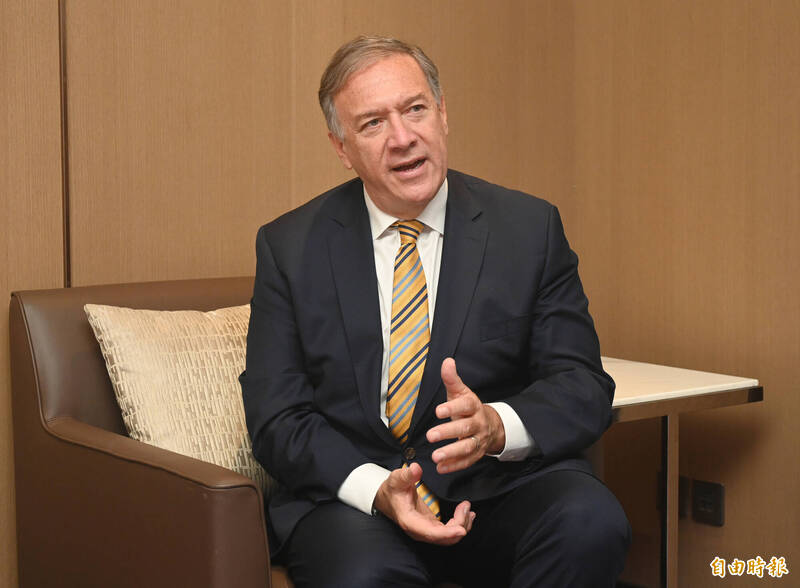Former U.S. Secretary of State Mike Pompeo accepted an exclusive interview with this newspaper on the 27th, and once again called on the U.S. government to officially recognize the status quo of Taiwan as a sovereign and independent country, and simply announce the facts that everyone already knows, which is safer for the world, the United States, and Taiwan itself. , reducing the risk of "strategic ambiguity".
(Photo by reporter Tian Yuhua)
[Reporters Wei Xibin, Guang Yanxin, and Yang Fuyi/Comprehensive Report] Former US Secretary of State Pompeo was invited to visit Taiwan and participated in the first "Global Taiwan Business Forum" hosted by the "Freedom Times" in Kaohsiung, and the World Federation of Taiwan Chambers of Commerce On the 27th, he received an exclusive interview with Wei Xibin, the deputy editor-in-chief of the newspaper, and Kayleigh Madjar, the editor of the Taipei Times.
Pompeo once again called on the U.S. government to officially recognize the status quo of Taiwan as a sovereign and independent country, and simply declare the fact that everyone already knows that "Taiwan does not belong to China" and has its own elements of a sovereign state. On the contrary, Taiwan itself is safer, avoiding the quagmire as Ukraine has and reducing the risk of "strategic ambiguity".
The following is a summary of the interview:
Q: What do you think of China's response to US House Speaker Nancy Pelosi's visit to Taiwan last month?
Do you think this is an "unprecedented provocation", or a predictable reaction?
Has the issue on both sides of the Taiwan Strait occurred in recent months, or has it changed at all?
How would you suggest the United States and other countries respond to this new equilibrium?
Please read on...
A: I don't think there is a new equilibrium.
I do think that what you've seen the Chinese Communist Party do, deploy fighter jets and launch missiles, shows what we already know: General Secretary of the Communist Party of China and Chinese President Xi Jinping is very determined to "unify" Taiwan, and we shouldn't turn a blind eye to this. The West is determined to respond accordingly.
As I said earlier, Western determination has an economic component as well as a security and diplomatic component, which does require "(strategic) clarity".
This is why I think it is important to acknowledge Taiwan as a free and sovereign country.
For America, you Taiwanese people will make your own decisions and others will feel it.
It's important for America to be clear about what we're doing.
When we're not articulated, we're vague, think about Ukraine, and get bogged down, I don't think Putin knows what the U.S. is going to do, what it's going to do and how to react.
When you're in a mushy area, and we know there's a lack of clarity, the bad guys push on, keep trying to get there, until there's resistance.
We don't offer this resistance now, and it doesn't require war, it doesn't require military conflict, it just requires resolve and determination.
Q: When you visited last time, you first called for the United States to formally recognize Taiwan. Given all the things that happened during that time, are you still calling for it now?
What do you think of China's possible reaction?
How should the international community prepare for and confront China's response?
A: Yes, I still think this would be the right policy, for the world, it must be for our country, it is also for Taiwan, it is better and reduces the risk, as I said earlier.
Second, I see the Chinese Communist Party overreacting, it's crazy about Pelosi's visit to Taiwan as a U.S. congressman, it shows weakness and vulnerability.
Think about what happened today?
They arrested the 90-year-old Catholic bishop emeritus Chen Rijun of Hong Kong for political persecution. Why?
Because they are afraid of a 90-year-old religious leader in their own country.
They have to deal with suing Next Media founder Jimmy Lai, just because he publishes a Chinese weekly daily in Hong Kong and simply reports the truth, all of which show the real vulnerability and real fear of the Chinese Communist Party leadership.
I think the US is simply declaring what everyone already knows: we all know that there is "one China" and that is the People's Republic of China, the Chinese Communist Party; Taiwan, which is separate, independent, not ruled by that place (China), Nor is it distantly related.
Taiwan has its own political leaders, its own economy, its own finances, its own banks, etc. All elements. It holds sovereignty here, and the United States simply acknowledges this reality, which will reduce risks in this region.
I think that's important.
